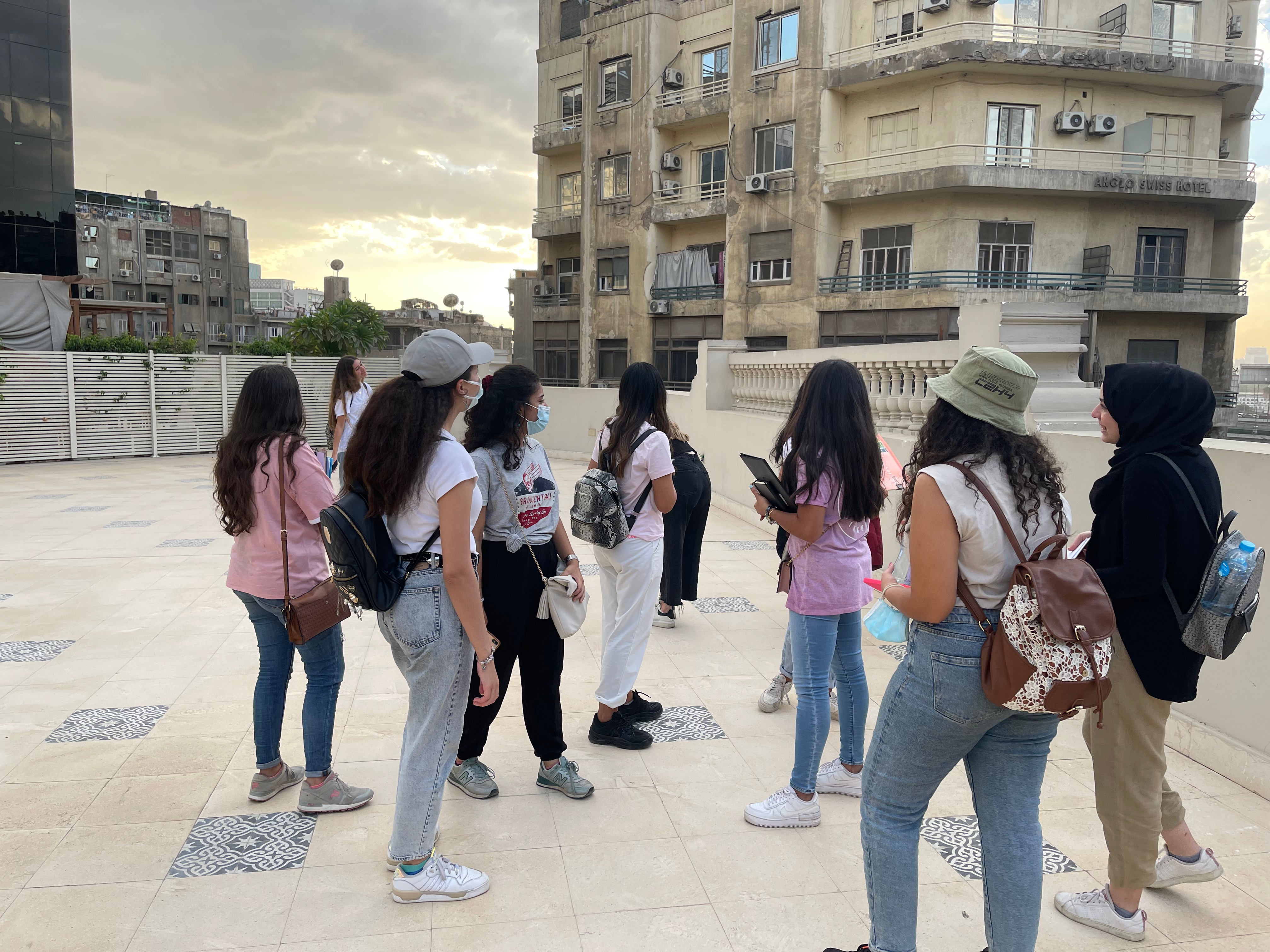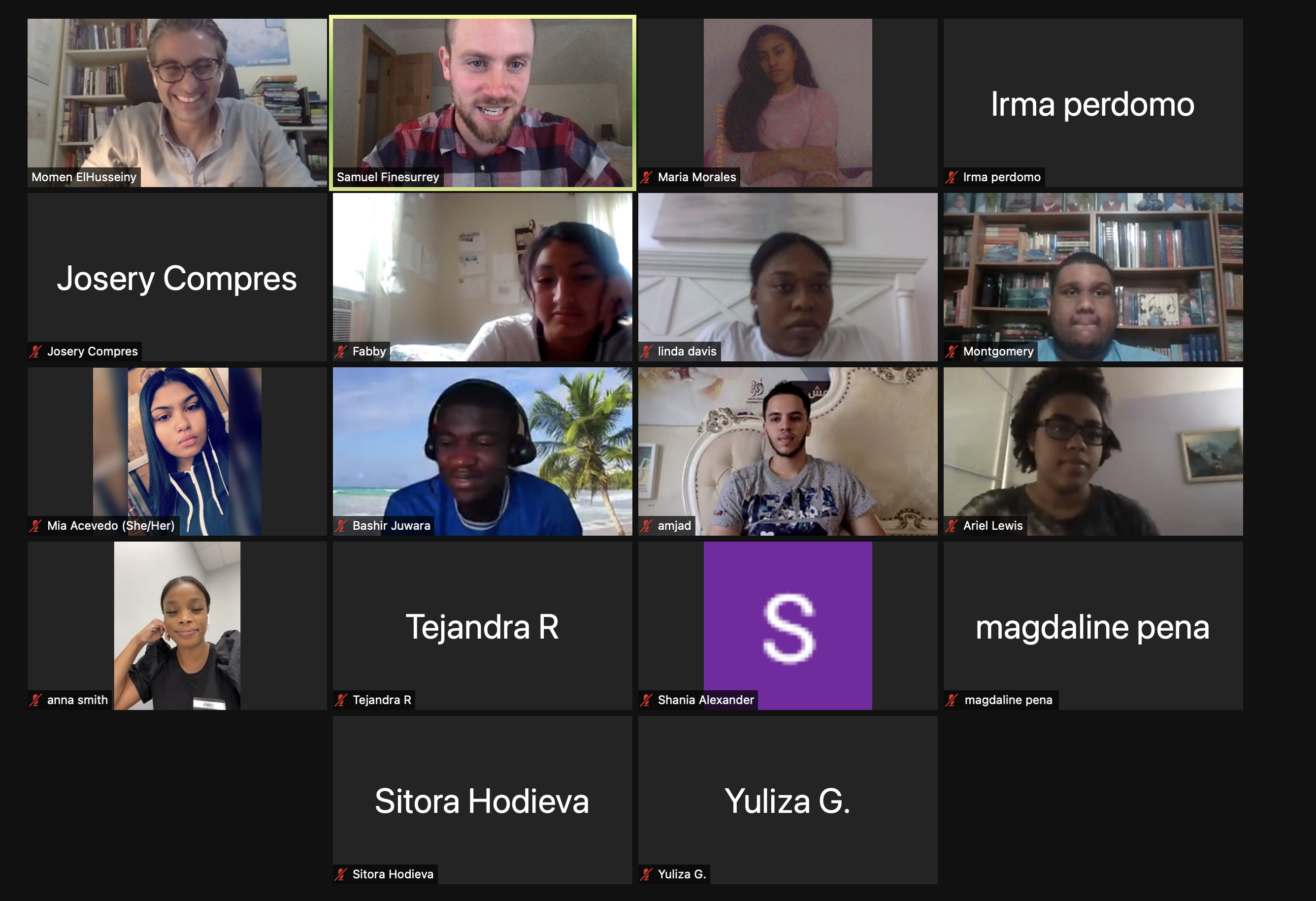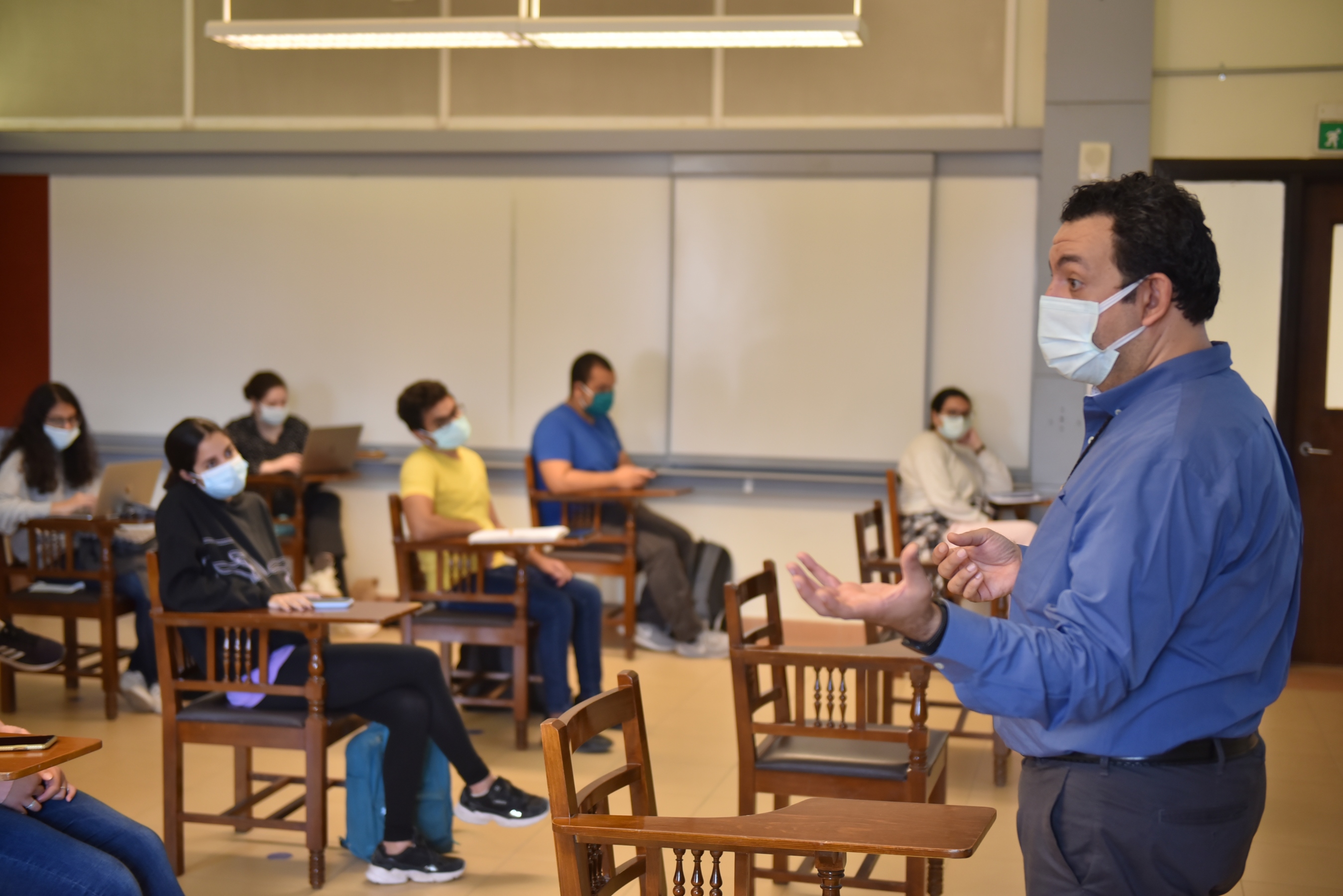
Global Virtual Exchange Program Connects AUC Students, Faculty with New York City Counterparts
“The world is changing with its problems and settings. It is time to move outside the boundaries, fences and walls enclosing our campus, classrooms and laboratories,” said Momen ElHusseiny, assistant professor of architecture and urban design.
ElHusseiny referred to his Urban Design and Landscape Architecture course, which was part of a new program at AUC this fall, Global Scholars Achieving Career Success (GSACS), that has enriched several courses through virtual exchange and experiential learning.
GCACS is a program under which students from universities in the MENA region and City University of New York conduct what is referred to as Collaborative Online International Learning centered around the UN Sustainable Development Goals and career readiness skills.
The fall cohort included more than 700 students hailing from AUC, the Borough of Manhattan Community College, Guttman Community College, Hostos Community College, LaGuardia Community College, Queens College, Abdelmalek Essaadi University in Morocco, Jordan University of Science and Technology and Palestine Ahliya University.
Along with ElHusseiny’s course, the five courses under the program at AUC this fall were: Yasmine Moataz’s Social Class and Inequality course, Brian Bowe’s Feature and Magazine Writing course, Adjunct Professor Shahinaz Imam’s Egypt Water Crisis: Challenges and Solutions course and Tameka Guillum’s Community Psychology course.
ElHusseiny’s course was paired with a course titled The History of Urban Life, taught by Professor Samuel Finesurrey at Guttman College. Their project, called Small Shops, Big Cities concerned “the different nature of inequality of shop owners in Downtown Cairo and Arab or Latino shop owners of food shops and bodegas in New York struggling with racism, the COVID-19 pandemic and environmental inequalities,” ElHusseiny explained.

Along with their professor, AUC students took to the streets of downtown Cairo to connect with the greater community and learn about their needs.
“Going downtown and passing through its streets, passageways and buildings to observe and analyze problems, patterns and sensory behavior was the first time to include reality and legibility in our design process,” recalled Habiba Ayoub, an architecture senior. “Yet interviewing the shop owners and listening to their problems took us into a deeper level of empathizing with them and their problems, which subconsciously opened our minds to some solutions.”
ElHusseiny added: “Between frustrations and hope, the class’s experience aimed to ground students to the reality toward making change from within the heart of the city, the aspirations of the people and the struggles of everyday urban life."
The students then exchanged information and stories with Finesurrey’s class, allowing them to learn about the inequalities facing a different part of the world. Ayoub listed a few, including the way women experience walking on the street and work, how those experiencing homelessness are treated and the accommodations made for people with disabilities.

Each university partaking in GSACS has a principal investigator (PI) who oversees the program’s implementation. Amina Elbendary ’96, ’00, associate professor of Middle East history and chair at the Department of Arab and Islamic Civilizations, and Ghada El-Shimi ’93, dean of Undergraduate Studies and the Academy of Liberal Arts and director of the Core Curriculum, are AUC’s co-PIs. The two have been coordinating with AUC faculty and their counterparts in New York since the program launched in Spring 2021.
In addition to the PI team, the project is supported by content experts who specialize in virtual exchange and/or MENA or U.S. cultures, career specialists and technology specialists from all participating institutions. Olga Aksakalova, professor of English at LaGuardia Community College, serves as GSACS project director.
“The most rewarding and unique part of this project is it enables a mutually enriching international virtual exchange not just for students, but also for several cross-campus teams of professionals,” Aksakalova explained. We are learning with and from each other as we work together toward a common goal.”
Elbendary and El-Shimi combed through proposals from different AUC faculty members and worked alongside Aksakalova and PIs from all participating institutions to envision possible exchange opportunities and create matches.
“Matching is where actually a lot of the work goes,” Elbendary said. “We were looking for that exchange aspect; it was the main criteria for the selection.”
Something else the PIs were aiming for was a healthy blend of courses from AUC’s different schools. They were able to create such a blend, as they received around 15 applications from AUC professors of different disciplines. “The perfect match is not necessarily two courses from the same discipline. It actually has to do with the module that the faculty are proposing for the exchange, such as the class activity, exercise or project the students will be working on,” Elbendary said.

Moreover, the PIs had to examine each pair through the lens of the UN Sustainable Development Goals. To narrow things down this semester, PIs chose to focus on just two: SDG #6: Clean Water and Sanitation, and SDG#10: Reducing Inequalities.
“These SDGs were selected carefully by the PI team to ensure that our students explore issues very pertinent to both MENA and U.S. communities today. We also aimed to provide options for faculty, where SDG #6 is very specific and SDG#10 allows for many topics,” Aksakalova said.
Another course that fell under SDG #10 was Professor Yan Yang’s Art History course at Borough of Manhattan Community College, which was paired with Bowe’s Feature and Magazine Writing course at AUC. This collaboration’s project helped students identify themes of inequality in art, theatre, dance, music and other related areas.
Yang reported that it was helpful having a theme under which to teach her students, as it made it easier for them to grasp certain concepts.
“Instead of focusing on simply the artist's message, we were able to take the work at hand and talk about its life outside of its immediate historical moment,” she said. “Since the theme is constant, students are able to apply it to different works and compare them in more meaningful ways.”
Students, professors and even the PIs reported excitement about engaging with peers from across the world and learning more about their world. “I was excited to explore more about the urban area of New York City and get to know its real issues,” student Ayoub said.
Yang added, “It was fascinating to see how despite our different cultures, the goal of teaching students to be thoughtful thinkers who can identify inequalities around them and enact change is common.”
Following the term of exchange, an end-of-semester conference took place in early December, during which students presented their work, listened to guest lectures on topics related to their courses and attended career development workshops aimed at equipping them to serve their local and global communities. Seventeen projects were born out of courses under the program this fall, including the five that took place between AUC and various colleges from CUNY.
GSACS is a cooperative program supported by the Stevens Initiative, which is sponsored by the U.S. Department of State, with funding provided by the U.S. Government, and is administered by the Aspen Institute. It is also supported by the Bezos Family Foundation and the governments of Morocco and the United Arab Emirates.
The program will continue at AUC through Spring 2023, with the following courses planned for Spring 2022: Management: Selected Topics for Core Curriculum and Environmental Issues in Egypt.
